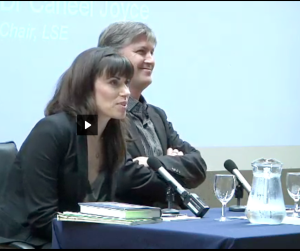Hi Caneel,
In “How to Keep an Idea Log You Will Actually Use” you talked, in part, about rereading your archive of ideas every 3 months. That is manageable, but I struggle with the revisiting of all the other information including: bookmarks, downloaded files, saved emails, hand written notes, etc.
I would very much like to know how you cope with the incredible amount of useful information at your fingertips. How do you organize everything that you collect (in different forms)? –Software Engineer
Hi Software Engineer,
I keep all of the data you’re talking about in simply structured (hardly tagged, mostly just thorough file names) folders on my hard drive.
I use
Evernote for highly formatted reference materials I’ve captured (web pages, pdfs not associated with a project, etc), and
Notational Velocity synced with my iPhone and iPad for reference notes to myself and reference lists (blog post ideas, books to read, cool companies, movies to see, etc.).
For big projects I keep a rich text
running log of progress, steps taken, ideas, any thoughts or questions or concerns that pop into my mind, etc – and all entries are time and date stamped. I include visual screenshots of everything I’m talking about, and often links to the files. I even timestamp my entries using a keyboard shortcut create using Smile Software’s
TextExpander (I type “ttm” to get the current date and time, then follow it with a quick description of what I’m doing… it’s addictive!). For any one day working I would enter about four pages of notes, just to give you a sense of how
stream of consciousness it all is.
I deal with everything as it comes and don’t revisit. My intuition guides my search for inspiration and ideas, my projects drive my search for everything else.
I believe in silence and randomness and fun, and I hate discipline and drudgery. I have a million RSS feeds going into my Google reader and some into the Pulse iPhone app (also a reader), and I look at them when I am on the tube or hanging out with nothing else to do, but when I tried to keep “on top of everything” that came through my RSS feed, I noticed I was creating a lot less, “working” a lot more, and always felt like I had homework hanging over my head. Sort of like a drone.
So now I just do what I want and try to read books/long articles and write a lot. Most of us have too much electronic input these days anyway.
Current projects drive my search for new information and stimuli. I use Safari bookmarks for bookmarks but mostly for keyboard shortcutting the bookmarks menu (e.g., command-6 is “
Bit.ly it”, command-7 just became “
Pinterest it”, etc.) but I feel no need to revisit most things.
I hope some of this helps. Please write back in the comments and let me know where you’d like to challenge me on the above. It’s a super nerdy but obsessively interesting topic. –the Caneelian




